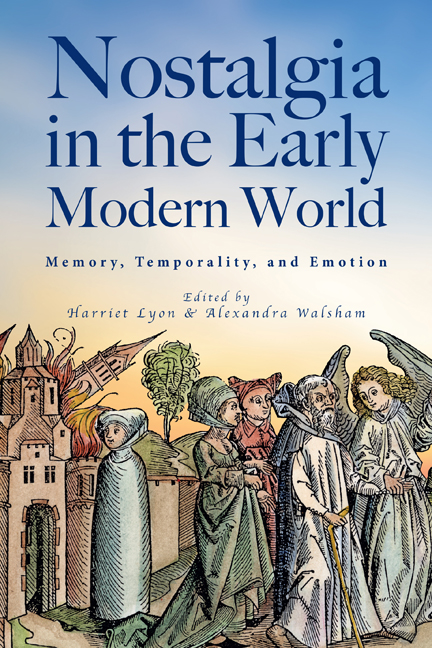Introduction: Early Modern Nostalgia: Memory, Temporality, and Emotion
Published online by Cambridge University Press: 11 January 2024
Summary
… my desire and longing day by day is still to reach my own home and to see the day of my return. And if this or that divinity should shatter my craft on the wine-dark ocean, I will bear it and keep a bold heart within me. Often enough before this time have war and wave oppressed and plagued me; let new tribulations join the old.
So speaks the Greek hero, Odysseus, to his captor, Calypso, on the island from which he longs to return to his homeland of Ithaca. Homer's Odyssey is partly a tale of homecoming – nostos – and of the sufferings – algae – engen¬dered by the longing for home. It is from this etymology that we get the word nostalgia, although not from Homer; as Svetlana Boym has noted, the term is ‘only pseudo-Greek, or nostalgically Greek’. It belongs instead to a different historical moment, some 2,500 years after the supposed composition date of the Odyssey, as well as to a very different geographical landscape. In its original coinage, nostalgia referred not to the Greek islands, but to the rugged terrain of the Swiss Alps. In the late seventeenth century, the physician Johannes Hofer observed that soldiers from the alpine region were often struck with a peculiar affliction upon leaving their native land for military expeditions in lowland France and Spain. Hofer's 1688 medical dissertation described how these mercenaries exhibited a longing for the fresh air and mountainous landscape of home, which manifested itself in symptoms such as fainting, fever, and even death.3 Like Odysseus, Hofer's soldiers felt acute pain at being separated from their homeland, which could only be relieved by their safe return. Hofer termed the painful longing they experienced, and from which they suffered, nostalgia (Figure I.1).
Nostalgia is, then, an early modern word. But until recently it has not usually been recognised as an early modern phenomenon. Despite the etymo¬logical history of the term, and despite harking back to the classical world, most scholarship on nostalgia has argued that it is a recent disease, a mode of remembering and affect that is both a hallmark and a symptom of modernity.
- Type
- Chapter
- Information
- Nostalgia in the Early Modern WorldMemory, Temporality, and Emotion, pp. 1 - 24Publisher: Boydell & BrewerPrint publication year: 2023

